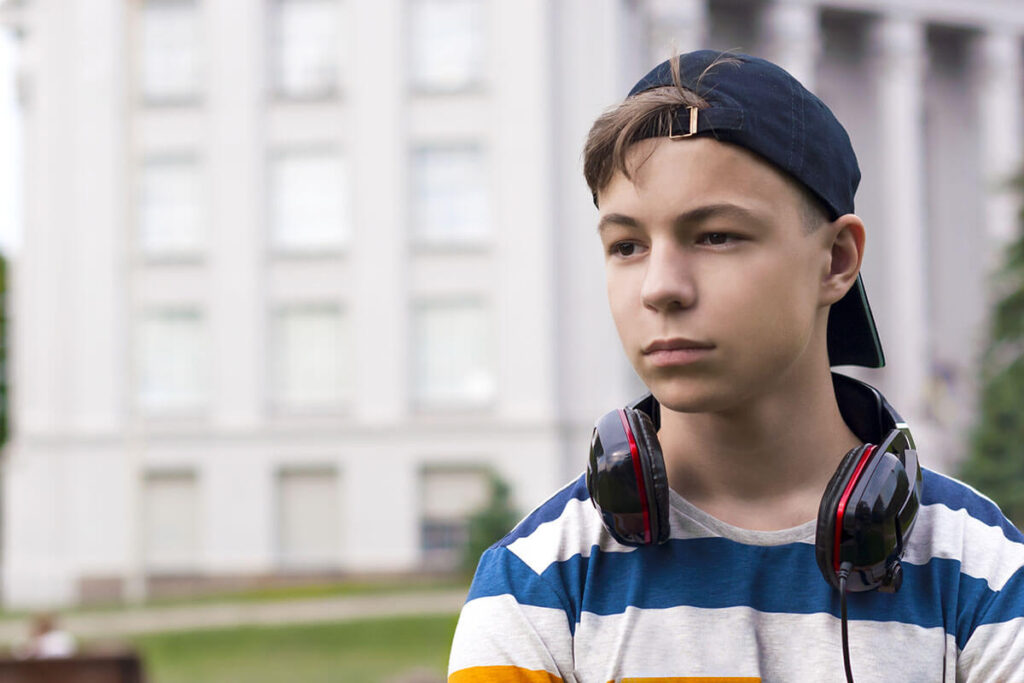Mental health with teens and school-related stress can aggravate mental health symptoms. Academic and social pressures at school can lead to increased anxiety. Sometimes, symptoms of mental health conditions in teens are mistaken for typical adolescent moodiness. Other times, many teens may continue to thrive scholastically and socially despite struggling with mental illness. If your teen needs treatment for a mental health and/or addiction problem, contact Foothills at Red Oak, and ask us about our dual diagnosis treatment program.
Mental Health with Teens and School
Balancing academic, social, and personal needs is especially difficult for developing adolescents. Physical and emotional changes that occur during puberty can make teens feel awkward and embarrassed. However, mental health disorders create additional stressors. Mental health conditions don’t have a known cause, meaning that anyone, regardless of age, race, or beliefs, can struggle with mental illness.
Certain factors, like experiencing trauma or having a close family member with a mental health disorder, can increase your risk of developing mental illness. Most adults who have a mental health disorder began experiencing symptoms before they turned 18, making it essential to notice symptoms of mental illness in teens.
Mental health with teens and school obligations can make juggling emotional needs and responsibilities complicated. Many teens who struggle with mental health disorders may try to conceal symptoms or resist treatment because of mental health stigma. Unfortunately, mental health disorders require early treatment as symptoms will continue to become more severe until you receive help.
Common symptoms of mental illness in teens include:
- Anger outbursts and increased irritability
- Expressing feelings of hopelessness, anxiety, or loneliness
- Avoiding friends and/or family members
- Changes in personality
- Engaging in self-harm
- Losing interest in hobbies
How Mental Illness in Teens is Treated
While struggling with a mental health disorder, especially as a teenager, can make you feel isolated and alone, mental illness is a common problem among adolescents. Anxiety-related disorders affect more than 30% of children ages 13 to 17, while another 13% of children between the ages of 12 and 17 struggle with depression. However, there is a solution to this problem.
Mental health treatment can occur in an inpatient or outpatient environment. One of the reasons addressing mental health problems early is so important is that symptoms can diminish your quality of life and increase your risk of developing a substance abuse disorder. Symptoms can also make it hard to build and maintain healthy relationships, which can lead to social isolation.
Inpatient mental health treatment programs are reserved for severe symptoms or crisis situations. Outpatient programs, which can include individual therapy and group counseling, allow you to return home every night. Both inpatient and outpatient mental health treatment programs use evidence-based and holistic therapies.
A psychiatrist can prescribe medications that can alleviate symptoms, although some medications may take several weeks to make a noticeable difference. If you don’t have a previously diagnosed mental health disorder, a psychiatrist or psychologist can evaluate your symptoms and begin treatment.
Finding Help Today
An essential aspect of mental health recovery is learning how to identify and change negative thoughts, feelings, and behaviors. Mental health disorders can cause negative thinking patterns, such as self-sabotage, that can undermine your recovery. Learning how to cope with uncomfortable thoughts and emotions is essential to managing your symptoms.
Since certain people, places, or things can trigger mental health symptoms, identifying your triggers, and finding healthy coping strategies helps manage symptoms. During treatment, your family and loved ones can participate in family counseling sessions to ensure that they’re supportive and understanding of your recovery needs.
Mental health with teens and school can make it hard for adolescents to balance their responsibilities with their physical and psychological needs. Symptoms can make socializing more challenging and impact your day to day life. If your teen is struggling with mental health symptoms, contact us today at 866.300.5275 to learn more about our programs.

